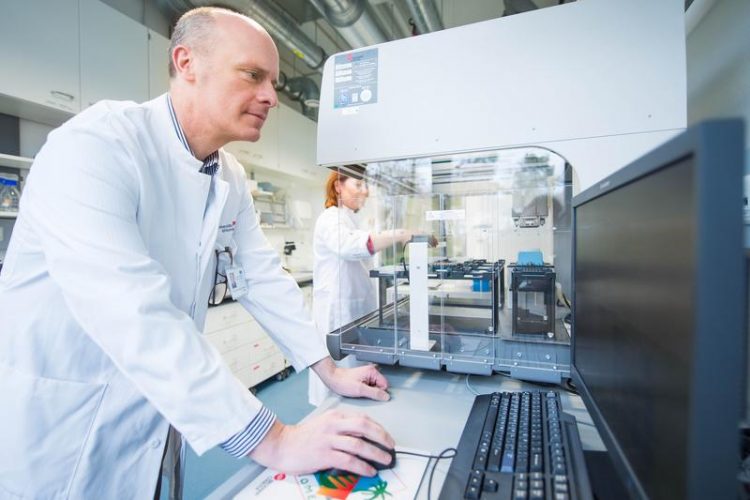Therapy Optimisation by Analysing the Genome

In the lab: Prof. Dr. Markus Nöthen, Director of the Institute of Human Genetics at the University Hospital Bonn. © Photo: Volker Lannert / Uni Bonn
Each human metabolises medication differently. Similar to the diverse factors forming diseases, the influences on the effect and tolerance of the prescribed medicine tend to be multifaceted. In addition to the age, weight, lifestyle and nutrition habits, and the intake of further medicines, patients’ genetic characteristics also impact the desired therapeutic effect.
In consideration of selected characteristics in the genome, pharmacogenetics enables an individual optimisation of the medication. Thus, patient-related risks and side effects can be reduced.
“The development of personalised therapies is making great progress.”
“The pharmacogenetic profile of a patient can be critical in determining an optimal medication. Especially when several drugs are prescribed and interactions between them are to be expected,” says Prof. Dr. Markus Nöthen, director of the Institute for Human Genetics at the University Hospital Bonn.
With its scientific working groups, it contributes to the research of the genetic causes of diseases and to the development of effective, individually tailored drug therapies and preventive measures.
“The partnership will enable us to use the innovative software and database developed by HMG and to introduce high-level pharmacogenetic diagnostics. In addition, a pilot project for patients at the University Hospital Bonn will be developed in the coming months. It is our vision that patients at our clinic benefit from the latest scientific knowledge in genetic medicine,” says Prof. Nöthen.
“The future of medical technology is personalised medicine”
HMG has developed an IT platform, which interprets clinically relevant genetic information of the patient and its influences on individual drug metabolism. The software consists of own pharmacogenetic database. Considering 173 genetic variations, it constitutes the current state of research and is based upon up-to-date findings of science.
The database is complemented by a drug interactions check, evaluating the interactions of 40,000 drugs and 60 food and beverages. This enables physicians to optimise the patient’s medication in an even more precise, safe and efficient way.
“We are convinced that this medical technology will prospectively provide the appropriate drug with the right dose at the right time for each patient. We are delighted to partner with the renowned Institute of Human Genetics at the University Hospital Bonn and Prof. Markus Nöthen. Together we are taking a major step to translate pharmacogenetics basic research to clinical routine and medical prescription,” says Herna Muñoz-Galeano, founder and managing director of HMG Systems Engineering GmbH.
For more information about the Institute of Human Genetics at the University Hospital Bonn:
https://www.humangenetics.uni-bonn.de/
For more information about HMG Systems Engineering GmbH:
https://www.hmg-systems-engineering.com
Media contacts:
Prof. Dr. Markus Nöthen
Director of the Institute of Human Genetics
University Hospital Bonn
Telefon: 0228/ 287-51100
E-mail: markus.noethen@uni-bonn.de
Herna Muñoz-Galeano
Managing director HMG Systems Engineering GmbH
Bettina Hofmann
Marketing & Communikations
HMG Systems Engineering GmbH
Telefon: 0911/ 97 91 08 57
E-mail: bettina.hofmann@munoz-galeano.com
Media Contact
More Information:
http://www.uni-bonn.de/All latest news from the category: Health and Medicine
This subject area encompasses research and studies in the field of human medicine.
Among the wide-ranging list of topics covered here are anesthesiology, anatomy, surgery, human genetics, hygiene and environmental medicine, internal medicine, neurology, pharmacology, physiology, urology and dental medicine.
Newest articles

Bringing bio-inspired robots to life
Nebraska researcher Eric Markvicka gets NSF CAREER Award to pursue manufacture of novel materials for soft robotics and stretchable electronics. Engineers are increasingly eager to develop robots that mimic the…

Bella moths use poison to attract mates
Scientists are closer to finding out how. Pyrrolizidine alkaloids are as bitter and toxic as they are hard to pronounce. They’re produced by several different types of plants and are…

AI tool creates ‘synthetic’ images of cells
…for enhanced microscopy analysis. Observing individual cells through microscopes can reveal a range of important cell biological phenomena that frequently play a role in human diseases, but the process of…





















